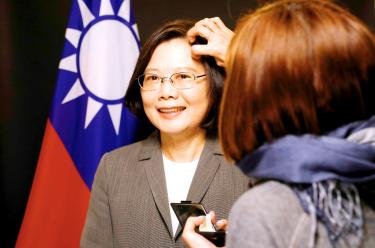President Tsai Ing-wen (蔡英文) said a direct telephone call with US President Donald Trump could take place again and urged China to step up its global responsibility to keep the peace as a large nation.
“We have the opportunity to communicate more directly with the US government,” Tsai said in an interview with Reuters yesterday. “We don’t exclude the opportunity to call President Trump himself, but it depends on the needs of the situation and the US government’s consideration of regional affairs.”
The interview was the first since Trump, as US president-elect, took a congratulatory telephone call from Tsai in early December last year. It was the first known contact between leaders of the two sides in nearly four decades and he cast doubt on Washington’s long-standing policy of acknowledging Beijing’s “one China” policy.
However, since then, Trump in February agreed to honor the “one China” policy and then hosted Chinese President Xi Jinping (習近平) at his Florida resort earlier this month.
Despite this, Tsai said Taiwan’s ties with the US, its biggest political ally and arms supplier, have been improving.
She added that Taiwan might need to buy the most advanced stealth jet the US has.
“We don’t rule out any items that would be meaningful to our defense and our defense strategy, and the F-35 is one such item,” Tsai said, in the first remarks by a top Taiwanese official on the matter.
As part of arms talks, Taiwan will eventually have to submit a weapons purchase list to Washington.
However, Tsai said that senior officials are not yet in place in the Trump administration to handle the issue.
The Chinese Ministry of National Defense yesterday said it was resolutely opposed to any nation selling arms to Taiwan.
Ministry spokesman Yang Yujun (楊宇軍) made the comment at a monthly news briefing in Beijing when asked about the possible sale of Lockheed Martin F-35 Lightning II jets from the US to Taiwan.
Speaking from her Presidential Office as she nears her first-year anniversary in office, Tsai urged Xi to act like a leader.
“China now needs to have its own sense of responsibility,” Tsai said.
“I hope Chairman Xi Jinping, as a leader of a large country and who sees himself as a leader, can show a pattern and flexibility, use a different angle to look at cross-strait relations, and allow the future of cross-strait ties to have a different kind of pattern,” she said.
China continues to pressure Taiwan, Tsai said, adding that next month’s meeting of the decisionmaking body of the WHO would be an important benchmark for relations between the two sides.
Taiwan has said it is facing a more complicated task this year in securing an invitation for the meeting after Beijing last year said that acceptance of the “one China” principle was a condition for Taiwan’s attendance.
When she first took office, China slammed Tsai’s inaugural speech as offering an “incomplete answer” to what it called the exam on bilateral relations.
“Why not say we both are facing a new exam. We also look forward to China using a different perspective to face this new exam,” Tsai said.
“China now needs to have its own sense of responsibility,” Tsai said, adding that the world is changing and China must change too.
Recalling her historic call with Trump, Tsai talked about more possibilities.
“My first feeling was that this is a new [Trump] government and perhaps under this new government there will be many different possibilities that appear,” Tsai said.
Tsai tweeted congratulations to Trump minutes after he took office in January, and when asked if she might tweet him again, Tsai said: “Might not be a bad idea. I’ll give some thought to it.”
Source: Taipei Times - 2017/04/28





















